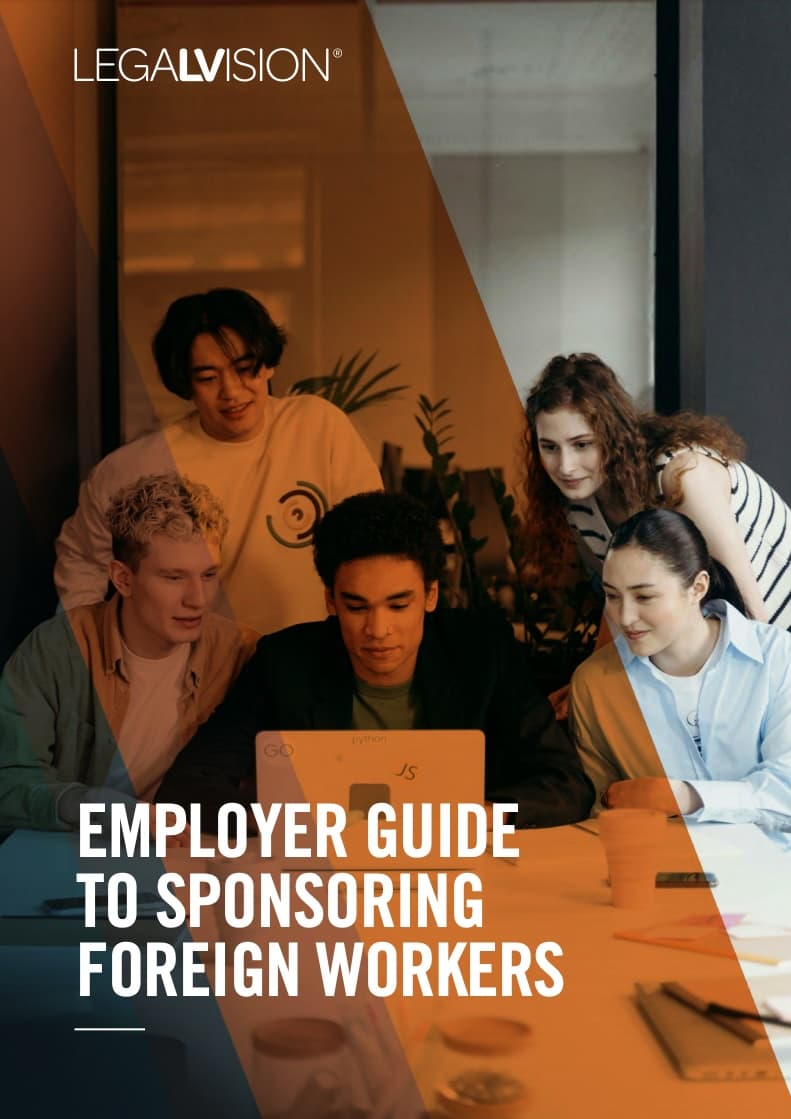In Short
- Sponsoring an Employee: Businesses in Australia must meet visa sponsorship requirements to employ skilled migrants, which include financial, compliance, and reporting obligations.
- Costs Involved: Expenses include sponsorship application fees, visa application fees, skills assessments, health checks, and potential legal or migration agent fees.
- Legal Obligations: Employers must comply with Department of Home Affairs rules, maintain records, and ensure the sponsored employee’s work conditions meet visa requirements.
Tips for Businesses
Plan and budget for all sponsorship-related costs before hiring a migrant employee. Ensure compliance with immigration rules, keep accurate records, and consider consulting a migration lawyer to navigate complex requirements and avoid penalties.
As an employer, you have access to a range of visas to hire foreign workers, ideal for when you need to fill a specialised positon. However, you may be considering the cost of sponsoring employees through this arrangement. Each visa has different types of costs associated with it, alongside fees you will need to pay to the Department of Home Affairs (DOHA). This article will discuss the costs that you must pay when sponsoring a foreign worker under the three main types of employer-sponsored visas in Australia; the:
- Temporary Skill Shortage Visa (subclass 482);
- Employer Nomination Scheme (subclass 186); and
- Skilled Employer Sponsored Regional (Provisional) visa (subclass 494).
All fees outlined below, in Australian Dollars, are correct at the time of the publication of this article.
Temporary Skill Shortage Visa (Subclass 482) (TSS Visa)
The TSS visa is a temporary visa and the most common type of employer-sponsored visa in Australia. It allows you to sponsor a skilled foreign worker to fill a position when you cannot find a suitable Australian worker. The employee you sponsor may stay in Australia for anywhere between one to four years, depending on their occupation and eligible stream.
When applying for a TSS visa and other employer-sponsored visas, the application process involves three stages:
- sponsorship;
- nomination; and
- visa application.
You must pay the fees involved at the sponsorship and nomination stage, whereas your employee can pay the visa application fees.
Sponsorship and Nomination
You are responsible for all fees at these two stages. For sponsorship, you must pay $420 to become an approved sponsor under the TSS visa.
When you nominate your employee under this visa, you must pay $330 to cover the application. Additionally, you are responsible for paying upfront the Skilling Australians Fund (SAF) levy to the government and cannot transfer this fee to your employee. The SAF levy is your contribution to developing the skills of domestic workers and will depend on:
- your business’ turnover; and
- the length of time you intend to sponsor your worker.
If your business’ annual turnover is less than $10 million, you will have to pay $1,200 per year of sponsoring your worker. However, if your turnover is $10 million or more, you will need to pay a higher amount per year, $1,800.
Additionally, if you are sponsoring multiple foreign workers, you must pay these costs separately for each worker.
For example, suppose you have a business turnover of less than $10 million and want to employ a worker for 2 years on this visa. In this case, your SAF levy would be $2,400 (2 years x $1,200).
Application
The costs involved with preparing and lodging the visa application can be paid by your employee and will vary depending on:
- which stream their occupation belongs to; and
- whether there are additional applicants included in the application.
If your employee’s occupation is on the medium/long-term list, they will have to pay:
- $3,035 if they are over the age of 18; or
- $760 if they are under the age of 18.
Alternatively, if your employee’s occupation is on the short-term list, they will have to pay:
- $1,455 if they are over the age of 18; or
- $365 if they are under the age of 18.
Employer Nomination Scheme (Subclass 186) (ENS Visa)
The subclass 186 visa allows you to employ skilled workers to live and work in Australia permanently. This is beneficial because you do not have to be a Standard Business Sponsor.
The ENS visa is a two-stage process, involving:
- nomination; and
- visa application.
There are three streams available under this visa:
- direct entry;
- temporary residence transition; and
- labour agreement.
Nomination
If your employee falls within the labour agreement stream and the position is located in regional Australia, you do not have to pay a nomination fee. Otherwise, you will need to pay $540.
Additionally, you will have to pay a SAF levy as a one-off payment, per nomination. If your business’ annual turnover is less than $10 million, your SAF levy will be $3,000. However, if your turnover is $10 million or more, you are required to pay $5,000.
Application
The amount payable for this section will depend on the relevant streams of your worker and any additional applicants you choose to include. You may cover this fee yourself or pass it on to your employee.
The fees per applicant are summarised in the table below.
| Applicant | Fee |
| Primary applicant | $4,640 |
| Secondary applicant over 18 | $2,320 |
| Secondary applicant under 18 | $1,160 |
Call 1300 544 755 for urgent assistance.
Otherwise, complete this form, and we will contact you within one business day.
Skilled Employer Sponsored Regional (Provisional) Visa (Subclass 494) (SESR Visa)
The SESR visa will apply to you if you are seeking to sponsor a skilled worker in regional Australia. This is a temporary visa, however; there is a pathway to permanent residency via the subclass 191.
The process is similar to the TSS visa, as the SESR is a three-stage process of:
- sponsorship;
- nomination; and
- application.
Sponsorship and Nomination
You must pay all the costs for the first two stages. The cost of becoming an approved sponsor is $420. There is no nomination fee for either stream of this visa. However, you will still be required to pay the SAF levy, depending on your business’ annual turnover. Your payable fee will be the same as that under the ENS visa, $3,000 or $5,000, depending on your business’ annual turnover.
Application
You may pay the application fee or choose to pass it on to your employee. The fee will depend on your employee’s relevant stream.
The fees per applicant are summarised in the table below.
| Applicant | Fee |
| Primary applicant | $4,640 |
| Secondary applicant over 18 | $2,320 |
| Secondary applicant under 18 | $1,160 |

Sponsoring overseas workers as an Australian business is complicated. Let us simplify it for you with this free employer guide.
Other Costs
In addition to government fees, there may be other costs associated with sponsoring an employee. These include the professional fees of a migration agent or lawyer to prepare and lodge the application on your behalf.
Additionally, you will need to pay any fees involving job recruitment and professional fees during the sponsorship and nomination stages of applying for your chosen visa. You cannot pass these onto your employee.
Further, your employee may need to pay certain costs to assist with their application. This includes fees for:
- an English test;
- skills assessment;
- police check;
- health check; and
- document translation.
Whether or not these additional fees will apply will depend on your personal circumstances.
Key Takeaways
There are various costs involved when becoming a sponsor and nominating an employee to work for you in Australia. It is important to consider these costs from the start, as this will help you understand whether employer sponsorship is a good option for your business. The costs will largely depend on the type of visa you choose. However, by law, you must pay the fees associated with:
- sponsorship; and
- nomination.
If you have any questions relating to the cost of sponsoring an employee, our experienced corporate immigration lawyers can assist as part of our LegalVision membership. For a low monthly fee, you will have unlimited access to lawyers to answer your questions and draft and review your documents. Call us today on 1300 544 755 or visit our membership page.
Frequently Asked Questions
Fees include sponsorship application fees, visa fees, skills assessments, health checks, and potentially legal or migration agent fees.
Yes. Failing to meet sponsorship obligations can result in fines, sanctions, or loss of sponsorship rights. Always ensure full compliance with Department of Home Affairs rules.
We appreciate your feedback – your submission has been successfully received.












